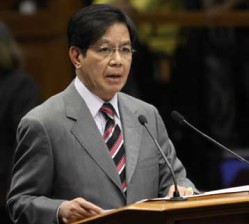Now they could heave a collective sigh of relief.
Sen. Panfilo “Ping” Lacson, who was cleared of the Supreme Court of murder charges for the alleged rubout of members of the Kuratong Baleleng gang in May 1995, yesterday said he is planning a reunion of sorts with all his coaccused in the 17-year-old criminal case.
“We are gathering so that together we can express our thanks since our problem has ended,” he added.
He said they would request the chaplain of the PNP to lead a Mass for them.
“Finally, I feel relieved. I feel happy there’s no more problem. This is my last case,” Lacson said.
Last year, the Supreme Court also trashed the double-murder charge against Lacson in connection with the deaths of publicist Salvador Dacer and his driver Emmanuel Corbito in November 2000.
A fugitive in 2010
In 2010, the senator left the country and went into hiding, surfacing only after the warrant for his arrest was withdrawn.
In a recent decision, the Supreme Court upheld the 2003 decision of the Quezon City Regional Trial Court dismissing the charges against Lacson and more than 30 others.
“Of course, we, especially my [former] subordinates, are quite relieved. Many of them were dislocated after all this controversy hounding us for so many years,” Lacson told reporters at the Senate’s regular news conference.
“I feel for them, my subordinates in Task Force Habagat (a Philippine National Police component of the Presidential Anti-Crime Commission, headed by then Vice President Joseph Estrada),” Lacson said.
A good number of his coaccused have either died or left the PNP while some are abroad, he said.
Target was Estrada
Lacson said those who fanned the controversy of the PACC’s alleged involvement in a rubout of robbery suspects wanted it to adversely affect the chances of the then popular Estrada in the 1998 presidential elections.
“The target was then Vice President Estrada. He was a shoo-in to become elected President in 1998. So the case became bigger and bigger. Much publicity was generated that’s why it went on and on,” Lacson said.
Lacson said he has no proof that then Speaker Jose de Venecia had something to do with the rubout case being used to demonize Estrada before the 1998 elections.
“But I was told by the late General (Jewel) Canson, who was one of the accused, that the camp of Speaker De Venecia talked to him. He was asked to involve me in the hope that I would point to President Estrada if things became unbearable for me,” Lacson said.
Estrada went on to win the presidency in 1998.
Lacson said the controversy continued after Estrada became president and when he himself was elected senator in 2001.
“So the controversy was passed on. The heat was passed on. Hopefully, this is really the end,” Lacson said.
But the senator said his entanglement in the Kuratong Baleleng rubout case was nothing compared to the persecution he suffered during the nine-year Arroyo administration.
Arroyo running mate?
Lacson revealed that former President Gloria Macapagal-Arroyo asked him to be her running mate in the 2004 presidential elections before they became bitter political foes during her presidency.
“From 2001 until shortly before they left [Malacañang], there really was no let up in giving me problems,” he added.
He was implicated in the Dacer-Corbito double murder case in the latter years of the Arroyo administration.
He said when Arroyo came to power after Edsa II in 2001 that resulted in the fall of Estrada, he sent his courtesy resignation from his post as PNP chief through then presumptive Executive Secretary Renato de Villa.
Lacson said De Villa even offered him ambassadorial posts but he declined.
Despite his courtesy resignation, Lacson said headlines carried the news two or three days later that he was sacked.
“That was my first taste of frustration with Mrs. Arroyo,” Lacson said.
